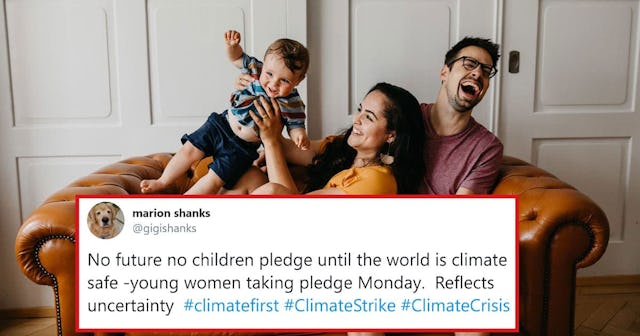Eco-Anxiety Is A Rising Concern For People Considering Parenthood

“I’m not bringing another person into this world until I see a decade of forward movement on tackling climate change. It feels irresponsible to have a kid when there is so little promise of anyone tackling climate change. In the next 50 years, the earth is going to be much, much more difficult and painful to live in,” my brother confidently declared in response to my question about whether he wanted to be a parent someday.
He is single and in his mid-20s. I knew having children wasn’t on his radar, but until I asked him, I didn’t realize eco-anxiety was his primary motivation for choosing a child-free life.
Fascinated, I spent a little time seeking out more information about his point of view. I joined a Facebook group dedicated to discussing the science of climate change. I asked if anyone was limiting their family size in part due to eco-anxiety, and there was a lot of interesting feedback. In addition to concerns about finances, several people included climate change and overpopulation as factors in their decision to limit their family size. One person said, “Climate change is a critical factor in why I’m personally on the fence about a second child.” Others added that they think having more than two children (one to replace each partner) is unethical given the state of the planet’s climate crisis.
It’s clear that this sentiment is alive and growing. There are even organized movements dedicated to reducing the worldwide rate of reproduction until we can change course on global climate change.
In an interview with Here and Now, 27-year-old grad student Allie Seroussi details how she came to choose a child-free life for the sake of the environment.
Seroussi says it all started when she stumbled upon this article, from the New York Times Magazine. It details how close science was to solving the climate change crisis in the 1980s. Ultimately, the issue has continued, unsolved, for thirty more years.
This information was the beginning of Allie Seroussi’s choice not to birth a biological child.
“I started to understand it wasn’t just trash in the ocean. It wasn’t just melting ice. It was really about a livable future,” she says. “And that was a lot for me to take in.”
In the interview, Seroussi explains her concerns about increased environmental pollution, decreased access to resources and even the threat of world war due to climate change. They all factor into her decision to remain child-free unless the climate crisis is solved.
Environmental pollution, decreased access to resources and even the threat of world war due to climate change all factor into Alllie Seroussi’s decision to remain child-free.
For Allie Seroussi, choosing not to birth a child doesn’t necessarily mean she can’t experience parenthood or contribute love to the life of a child.
“I also think that there are many ways to have a family, and it doesn’t necessarily mean having one biologically. … It could mean adopting, it could mean foster care.”
She chooses to spend her time in community with other people’s children, contributing to their lives as a friend and supporter.
Seroussi acknowledges that her choice not to have children is not right for everyone.
“Even if you pull the climate crisis away and it doesn’t exist anymore, I think the decision to have children or not is one that each person, family, couple needs to make on their own.”
Some climate-change experts don’t think it’s necessary to choose not to have children. David Wallace-Wells is the author of “The Uninhabitable Earth.” It’s a controversial-but-sobering look at the severity of our current climate change crisis. It details the impact that allowing global warming to continue unchecked could have our future generations. He welcomed his first child while he was writing the book.
“For reasons independent of climate, I wanted to have children,” says Wallace-Wells. “Most people do. I don’t think this is an impulse we need to disavow before we have finished the final act of this story. I think it is a reason to fight now so that we can continue to have those children and continue to live in the ways we want to live. It is possible regardless of how bad the news from science is.”
And listen, we know the news isn’t great. Most scientists agree that people have contributed to the mess we are in now, so people need to work to fix it.
It is good for individuals to do what we can to reduce our carbon footprint. We all know that carpooling, limiting personal air travel, and toting around reusable water bottles won’t magically fix the planet. But until world leaders and lawmakers start making sweeping climate change policy changes, reducing our consumption certainly won’t hurt.
For some, this means choosing not to bring any more people into the world.
But what about those of us who already have children? One of the best things we can do is speak up with our votes. That’s part of the reason David Wallace-Wells says he chose to write his book using direct and catastrophic language.
“It is important to mobilise people who at the moment are concerned, but basically complacent, and turn them into people who are much more activated and essentially voting about climate as a first-order political priority rather than a third- or fourth-order priority – judging politicians on the basis of their climate policy.”
This article was originally published on